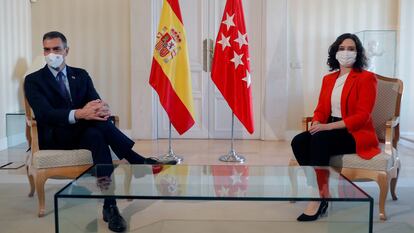Spanish PM meets Madrid chief over Covid-19 measures, warns of ‘very tough weeks ahead’
The face-to-face between Pedro Sánchez and Isabel Díaz Ayuso signaled a thaw in months of frosty relations

Spanish Prime Minister Pedro Sánchez on Monday warned about the need to consider “other scenarios” and warned of “very tough weeks up ahead” as the coronavirus epidemic continued to escalate in the Madrid region.
Speaking after a face-to-face meeting with Madrid regional premier Isabel Díaz Ayuso to coordinate measures against the spread of the coronavirus, Sánchez indirectly alluded to the state of alarm that kept Spaniards mostly confined to their homes between mid-March and mid-June.
“We must be prepared to consider other scenarios if necessary,” said the leader of the Socialist Party (PSOE), who heads a minority government in coalition with the leftist Unidas Podemos. Sánchez added that because of its situation and characteristics, “Madrid needs a special plan.”
Together we will prevail. This is an epidemiological battle, not an ideological oneSpanish PM Pedro Sánchez
The meeting on Monday between Sánchez and Díaz Ayuso signaled a thaw in tense relations and sought to provide an image of coordinated action in what is now Europe’s hardest-hit region. Sánchez insisted on the idea of unity. “Together we will prevail. This is an epidemiological battle, not an ideological one.”
The two administrations have made it clear that they will work together, but that Madrid will have the final word. “There are very tough weeks up ahead,” warned Sánchez, insisting that the regional government will maintain all its powers and continue to make the bulk of the decisions. Díaz Ayuso had been a vocal critic of the Sánchez administration throughout the three-month national state of alarm, claiming that the central government was not letting regional authorities handle the health crisis effectively.
But a spike in outbreaks over the summer months, after powers had been fully restored to the regions, evidenced that the Madrid government had not prepared sufficiently for a second wave despite pledges to do so during the deescalation process. More than one in five hospital beds in the region are currently occupied by Covid-19 patients, the region’s primary healthcare system is stretched to the limit, and there are still not enough contact tracers to manage the crisis. “Madrid knows what it has to do, but it lacks the resources,” said Díaz Ayuso on Monday.
Madrid knows what it has to do but it lacks the resourcesMadrid premier Isabel Díaz Ayuso
Less than three months after the end of deescalation, Madrid officials last week called on the central government to get “actively involved” in containing the spread of Covid-19. The comments followed a chaotic week for the Madrid government, which is run by a coalition between the conservative Popular Party (PP) and Ciudadanos (Citizens), with support from the far-right Vox, due to a communications blunder.
After resisting new restrictive measures, Díaz Ayuso on Friday announced selective lockdowns in 37 areas of the Madrid region where incidence is in excess of 1,000 cases per 100,000 people. The measures, which came into effect on Monday, affect around 855,000 residents, or 17% of the population of the Madrid region. The restrictions triggered a wave of weekend protests by local residents who claimed that working-class neighborhoods are being unfairly targeted.
Coronavirus epicenter
The Madrid region has once again become the epicenter of the coronavirus crisis in Spain, accounting for more than one third of all new reported infections. The 14-day cumulative incidence of Covid-19 in the Madrid region is more than 600 cases per 100,000 people, compared to the national average of 267, according to the epidemiological report published by the Spanish Health Ministry on Friday.
“The epidemic is becoming stronger in a very worrying way. Only with joint action will we be able to overcome this situation,” said Díaz Ayuso at Monday’s press conference.
After emerging from the regional government headquarters in Madrid, Sánchez and Ayuso said they have agreed to create a permanent joint working group that will make recommendations on a weekly basis to Spain’s health minister, Salvador Illa and to Madrid health chief Enrique Ruíz Escudero.
Both sides also agreed on the need to shore up Madrid’s primary healthcare system, which is once again under tremendous strain. Reinforcements were also announced for contact tracing teams, disinfection personnel and police to ensure that the selective lockdowns are observed.
On Friday, Sánchez insisted that from now on it will be up to regional leaders, not the central government, to request a state of alarm in their territory if they feel it is necessary. Díaz Ayuso said that she is prepared to do whatever it takes, but that for now she does not see a Madrid-wide lockdown as a solution.
“That would be death for our region. We cannot shut down all of Madrid without giving ourselves a chance,” she said. “We’re going to try out this plan, and if it works, it will be extended to other areas.”
English version by Susana Urra and Melissa Kitson.
Tu suscripción se está usando en otro dispositivo
¿Quieres añadir otro usuario a tu suscripción?
Si continúas leyendo en este dispositivo, no se podrá leer en el otro.
FlechaTu suscripción se está usando en otro dispositivo y solo puedes acceder a EL PAÍS desde un dispositivo a la vez.
Si quieres compartir tu cuenta, cambia tu suscripción a la modalidad Premium, así podrás añadir otro usuario. Cada uno accederá con su propia cuenta de email, lo que os permitirá personalizar vuestra experiencia en EL PAÍS.
¿Tienes una suscripción de empresa? Accede aquí para contratar más cuentas.
En el caso de no saber quién está usando tu cuenta, te recomendamos cambiar tu contraseña aquí.
Si decides continuar compartiendo tu cuenta, este mensaje se mostrará en tu dispositivo y en el de la otra persona que está usando tu cuenta de forma indefinida, afectando a tu experiencia de lectura. Puedes consultar aquí los términos y condiciones de la suscripción digital.








































